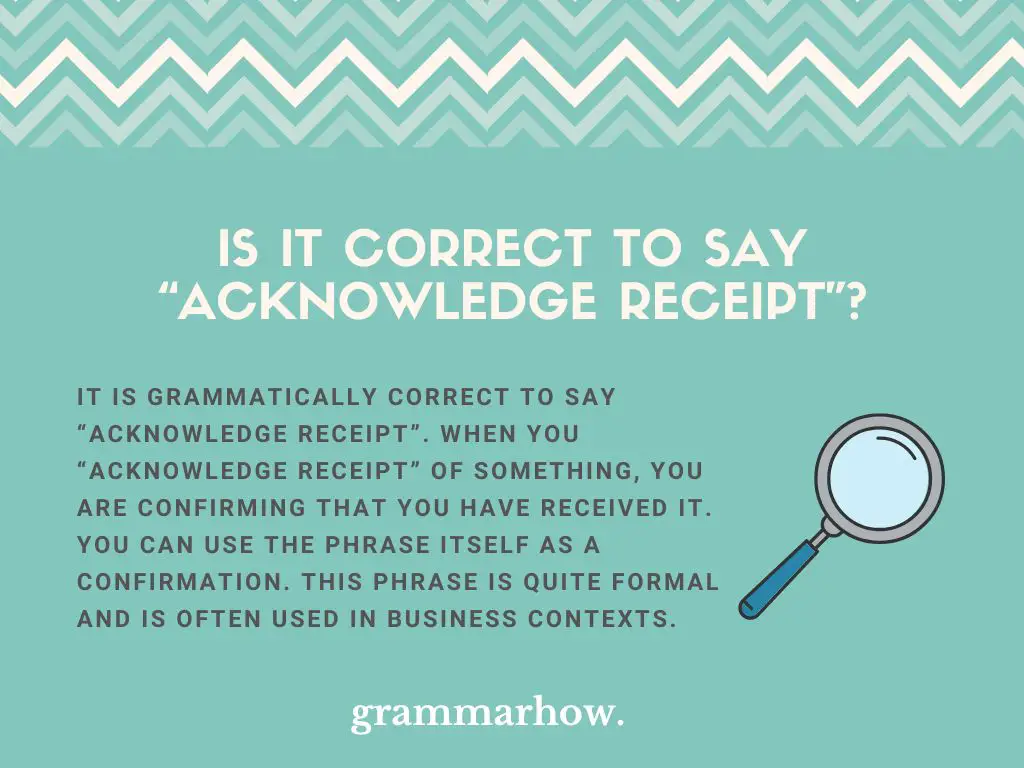
When someone sends you an email, message, or even (very old-fashioned) a proper paper letter, it’s polite to respond and let them know that you’ve received this.
You might have seen people referring to this polite response as “acknowledging receipt”.
Is that correct and how do we use it?
It is grammatically correct to say “acknowledge receipt”. When you “acknowledge receipt” of something, you are confirming that you have received it. You can use the phrase itself as a confirmation. This phrase is quite formal and is often used in business contexts.

The phrase “acknowledge receipt” is often used as a request. For example, you may receive an email that contains some important documents and asks you to “acknowledge receipt”. This is the person who sent the email asking you to respond and confirm that you have the documents.
This is a safety measure when dealing with important information as, without a response, the sender couldn’t be certain that the email actually made its way to you.
It also helps them to cover their own backs! If later down the line, you try to say that you never received the documents, they have evidence that you did. You little liar.
Multi-purpose, while “acknowledge receipt” can be a request it can also be a response. You can reply to someone who has asked you to “acknowledge receipt” by simply saying “I acknowledge receipt”. It’s still correct English!
Here are some examples of how to say “acknowledge receipt” in a sentence:
Any response email will “acknowledge receipt” though, so it’s not always necessary to use this exact phrase. Now we’ve covered the correct ways to use “acknowledge receipt”, we’re going to look at what to say instead of “acknowledge receipt” if you’re looking to switch it up a bit.
Other ways to say “acknowledge receipt” are “confirm receipt”, “acknowledge delivery”, and “confirm delivery”. These phrases all work well as synonyms because they can be used as both a query and a response in the same way that “acknowledge receipt” can be.
In this scenario, to confirm something means to make it certain. The word “receipt” has remained the same and continues to stand for the reception of the item. As such, the purpose of the phrase is the exact same as “acknowledge receipt”, just with slightly different wording.
Here, we are keeping the word “acknowledge” the same but switching out the last word.
“Delivery” is the act of transferring goods from one place to another, so this phrase is asking that you acknowledge that this particular delivery has been completed.
Now, we’re coming back to the term “confirm” and combining it with “delivery” instead. You can mix and match the words and still achieve the same meaning, even though the words we’re using aren’t exact synonyms of each other. In this context, they work.
When someone asks you to “acknowledge receipt” or “confirm receipt”, that doesn’t mean you need to respond with that exact phrase.
There are many different ways that you can reply that show you have read their message. This phrase is a quick, informal, and friendly way to do that.
This is another way to say “acknowledge receipt” that can only be used as a response rather than a query. You can’t ask someone to “message received” but you can certainly tell someone “message received”.
“Duly” means to do something in the correct way or at the correct time, while “noted” means to have paid attention to something. So, altogether, the phrase means “to have taken account of something properly”. As such, it makes an appropriate response to a request to “acknowledge receipt”.
As defined by the Cambridge Dictionary, “acknowledge” means “to accept, admit, or recognize something, or the truth or existence of something”.
“Receipt” is defined as “the act of receiving something”, with this example given:
So, when these two words are combined, the phrase is asking you to recognize that you have received something, whatever that thing may be.
It is an interesting phrase in that it can also be used as a response to its own request, the following exchange is perfectly correct English:
The acknowledgment of the receipt is an action that one person is requesting and the other completes. The second person is confirming that they have completed the action, as requested.
“Acknowledged receipt” is just the past tense of the phrase “acknowledge receipt”.
The word “receipt” doesn’t change depending on the tense because it’s a noun. The word “acknowledge” does because it’s a verb.
You can’t use “acknowledged receipt” as a request in the same way that “acknowledge receipt” can be used:
This is because it’s impossible to ask someone to do something in the past tense unless you have a time machine, which would be cool if you did. But you don’t, so don’t do it.
It would also be wrong to use it as a response if the rest of what you’re writing is in the present tense:
However, it’s perfectly correct to use when you’re writing in the past tense:
Martin holds a Master’s degree in Finance and International Business. He has six years of experience in professional communication with clients, executives, and colleagues. Furthermore, he has teaching experience from Aarhus University. Martin has been featured as an expert in communication and teaching on Forbes and Shopify. Read more about Martin here.